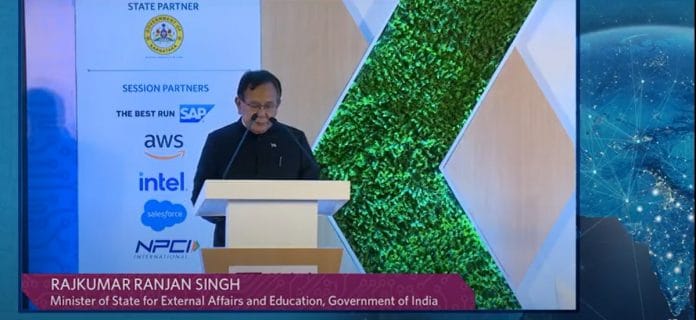New Delhi: Minister of State (MoS) for Education and External Affairs Rajkumar Ranjan Singh has batted for the Modi government’s National Education Policy (NEP) launched in July 2020 as well as Indian Edtech startups like Byju’s and Unacademy.
Speaking at the sixth edition of Global Tech Summit Tuesday, Singh said, “The National Education Policy (NEP) reflects our resolve to give students and youth access to cutting-edge emerging technologies in education. The policy, he added, recognises the need to integrate technology at every level of delivering educational services.
The summit, held annually since 2016, is jointly organised by the Ministry of External Affairs and think tank Carnegie India. ThePrint is a digital partner for this year’s virtual event.
While discussing India’s growing edtech sector, Singh said: “There are over 4,500 startups in the edtech space today. It is a space geared for exponential growth with an estimated market size of $30 billion in the next 10 years. The unicorns in this sector, like Byju’s and Unacademy, are common household names today.”
“Grassroot initiatives like Hamara Vidyalaya in Arunachal Pradesh, Assam’s Career Portal, Jharkhand’s Digi-SATH, Himachal Pradesh’s Har Ghar Pathshala… are coexisting healthily in the Indian edtech ecosystem,” he added.
Referring to the Modi government’s vision of ‘Atmanirbhar Bharat (self-reliant India)’, Singh said: “We also need to encourage self-reliance in emerging technology areas in India. This will help us bring cost-effective solutions for diverse educational requirements…”
Need to leverage edtech
Singh noted how the nationwide closure of schools during the pandemic caused disruptions in learning and teaching.
“Physical closures of 15.5 lakh schools during the pandemic affected more than 248 million students for over a year. We tried to leverage edtech so that students — the future of this country — could continue their learning process with minimised hindrance,” he said.
He also said the National Education Technology Forum, a platform envisaged by the NEP for free exchange of ideas on the use of technology, provides the country with a “strategic direction” for adopting technology in education services.
“NEP 2020 is designed to transition the education sector in India towards the fourth industrial revolution,” he added. The core areas of focus of this industrial revolution would include AI, machine learning, augmented and virtual reality, educational software platforms etc, he said.
Singh also said the government is currently in the process of transforming Digital Infrastructure for Knowledge Sharing (DIKSHA), a tech-based platform launched in 2017, for access through TV and radio platforms.
(Edited by Neha Mahajan)
Also Read: Student-centric NEP will change society, Karnataka education minister says as state unveils policy






